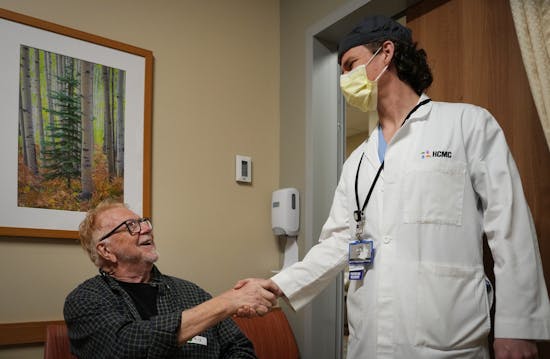When a former photographer woke up one February morning unable to see out of his right eye, he panicked. He had always been a visual person, thinking in images instead of words long after his career as a food photographer ended.
"I was terrified. ... Everything about my life was visual," said Jerry Robb of Loretto. "Going blind has always been my nightmare."
Robb's vision in his right eye was completely black. He had visited his eye doctor the day before, when his vision began to go dark at the corners. But the optometrist saw nothing wrong with his eye and told him it might go away.
The next morning, with Robb blind in one eye, his wife jumped into action and searched for ophthalmologists online. It was a Saturday, so many offices were closed.
Then someone directed them to a doctor at Hennepin Healthcare who was on vacation. Even on the ski slopes, Dr. Anne Abel, a faculty member in ophthalmology, arranged for a team to see Robb.
When he arrived at the hospital later that morning, Robb, 73, was wheeled to a team of doctors that made him feel like the president of a small country, he said. Then, third-year ophthalmology resident Dr. Laurence Ducker walked into his exam room with a cart full of expensive eye exam equipment stuffed inside hardware store tool boxes, making Robb laugh.
Ducker examined Robb's eyes and came to the conclusion that it was probably giant cell arteritis, or GCA, a rare autoimmune disease that affects older adults and is seen most commonly in women.
There was a distinct appearance to Robb's optic nerve that tipped off Ducker. About an hour after Robb's arrival at Hennepin County Medical Center, Ducker began treatment: a high-dose IV of steroids to reduce inflammation and stop any further damage.
Still, Ducker was not expecting Robb's right eye to improve. His vision loss was related to blood flow, and typically that is permanent.
"We see a little bit of recovery sometimes. We'd certainly never expect any recovery," Ducker said. "It's always just hoping that it doesn't get worse. I think it's a wonderful little miracle."
With each round of steroids, Robb started to regain a bit of his vision.
It was Ducker's first time treating a new case of GCA. Quick timing was key to Robb's treatment. After three days in the hospital, Robb was sent home with oral steroids and is learning to adjust to partial vision in that eye. At first it was difficult to make his eyes work together again, he said, but that is improving.
Though Robb is saddened by his decreased vision, to regain any at all felt like divine intervention, he said at a follow-up appointment this week.
Both Ducker and Robb want to raise awareness that sudden blindness is a medical emergency. People should go to the emergency room or to an eye doctor right away.
"I think we see all too often that people call us and they say, 'I've been blind for five days' and it is almost always too late at that point," Ducker said. "There are rare conditions like this, and others, that cause sudden severe vision loss that are treatable, but time is of the essence."



